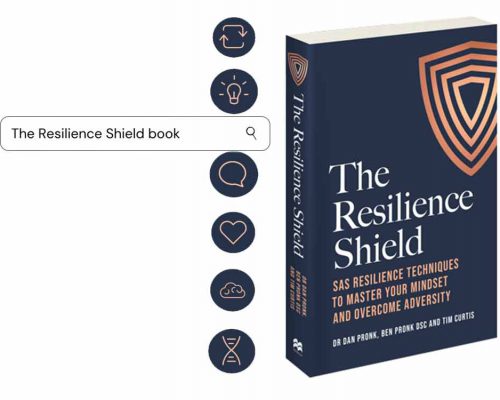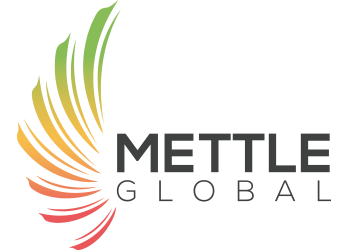Resilience

Our resilience methodology has been codified in a book
Mettle’s proprietary Resilience Shield was developed by Dr Dan Pronk, Ben Pronk and Tim Curtis, all of whom are SAS veterans with combat experience in theatres including Afghanistan, Iraq and Timor Leste. The model was developed after the authors witnessed first-hand the markedly different reactions that ostensibly similar individuals had to stressful events, including the gruelling SAS selection course as well as the incredible demands of leading high-performance teams in military operations – life and death situations with national strategic implications.
This experience drove a deep desire to understand exactly what resilience was and – crucially – how it could be developed and improved in individuals and organisations. Through research conducted over a period in excess of ten years, the authors sought to identify the constituent elements of stress and resilience and develop a model that was dynamic, multi-factorial and modifiable. The result was the Resilience Shield – a highly applied model of resilience that identifies the key constituent characteristics of this mercurial quality and provides a framework for the development of a Resilience Action Plan.
Since its development, we have delivered programs based on the Resilience Shield to organisations as diverse as elite policing units, academic organisations and tax professionals. While the concept might have originated within a military context, we are firmly of the belief that resilience requirements vary only by degree and our successful implementation of the Resilience Shield across a wide range of sectors has reinforced this.
Our resilience methodology has been codified in a book, The Resilience Shield. This book combines learnings from amazing lived experiences with cutting-edge academic and medical research to offers special operations techniques to master your mindset and overcome adversity.
Mettle’s proprietary Resilience Shield was developed by Dr Dan Pronk, Ben Pronk and Tim Curtis, all of whom are SAS veterans with combat experience in theatres including Afghanistan, Iraq and Timor Leste.
The model was developed after the authors witnessed first-hand the markedly different reactions that ostensibly similar individuals had to stressful events, including the gruelling SAS selection course as well as the incredible demands of leading high-performance teams in military operations – life and death situations with national strategic implications.
This experience drove a deep desire to understand exactly what resilience was and – crucially – how it could be developed and improved in individuals and organisations. Through research conducted over a period in excess of ten years, the authors sought to identify the constituent elements of stress and resilience and develop a model that was dynamic, multi-factorial and modifiable. The result was the Resilience Shield – a highly applied model of resilience that identifies the key constituent characteristics of this mercurial quality and provides a framework for the development of a Resilience Action Plan.
Since its development, we have delivered programs based on the Resilience Shield to organisations as diverse as elite policing units, academic organisations and tax professionals. While the concept might have originated within a military context, we are firmly of the belief that resilience requirements vary only by degree and our successful implementation of the Resilience Shield across a wide range of sectors has reinforced this.
Our resilience methodology has been codified in a book, The Resilience Shield. This book combines learnings from amazing lived experiences with cutting-edge academic and medical research to offers special operations techniques to master your mindset and overcome adversity.
Assess Your Resilience
Our Resilience Survey has been designed to allow you to benchmark your resilience.
This survey is part of a research program being carried out in collaboration with Dr Lies Notebaert, within The University of Western Australia’s School of Psychological Science. The purpose of the research is to help improve our collective understanding of resilience and to assist you in identifying areas which might assist develop your own individual resilience. By completing the survey, you will be helping to further develop our understanding of how resilience really works – and how it can be improved! In return, you will receive feedback on your current levels of resilience, plus the option of a full report highlighting the constituent elements of your resilience and your relative strengths and weaknesses. You can access the survey here.


